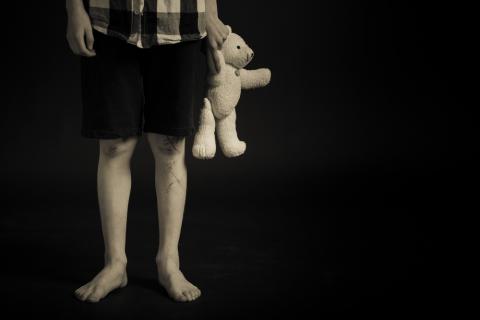
Image courtesy of Shutterstock.com
Many parents are concerned about their child’s anxieties. All children have anxieties, yet sometimes they seem excessive. Parents can best help their when they understand the nature of their child’s inner experience, and are able to see the world through their eyes.
What is anxiety?: We are hardwired to experience anxiety, and thank goodness we are. Although it may feel as if anxiety descends on us, we actually actively generate anxiety to signal ourselves that we perceive a danger.
If a train is coming toward us, we generate anxiety based on pre-existing judgments about danger. This is more efficient than rethinking every danger situation. We respond to this signal rapidly with fight or flight defense — or coping — mechanisms.
The danger can be coming from the outside, like a train, or from the inside, such as certain impulses, desires and thoughts. For example, as early as infancy, children learn that biting impulses are disapproved of — strongly!
As children grow, they decide that other internal impulses, as well as certain emotions and thoughts, are dangerous. Perhaps they imagine, correctly or not, that these thoughts are unsafe personally, might hurt others physically or emotionally, or will incur the disapproval of loved ones. Children learn to read these internal states as dangers and activate the defense mechanisms of fight or flight internally. Usually, the signal of anxiety that children generate is tiny and their response immediate; it all occurs unconsciously.
Understanding anxiety in children: There are three possible factors when a child is excessively anxious:
• A child may be hardwired to respond to danger with an excessively strong signal, usually for genetic reasons.
• A child’s coping mechanisms may be inadequate in some way. Such a child produces anxiety signals of appropriate strength, but either cannot efficiently eliminate the anxiety with coping maneuvers or eliminates it with strategies that produce new problems, possibly inattention or impulsiveness, for example.
• A child may interpret many situations as dangerous, generating more anxiety than she can handle efficiently. This over-reading of danger can develop for two possible reasons. A child may have endured frightening external events and be continuing to react to certain external situations as dangers. Or, for highly individualized reasons, a child may decide that many of his impulses, feelings and thoughts are dangerous. In this situation, the child is unable to escape the dangers in his mind.
How to help: Parents can help their overanxious children in several ways. Since the most likely possibility is that such a child over-reads danger, parents can consider whether he or she has been frightened by events in her life, such as a death of a pet, long trips by a parent, illnesses or deaths of loved ones, miscarriages, moves, parental discord or emotional changes in a parent. If this seems possible, parents should continue to talk about these events even though the child may seem to have coped or moved beyond them.
Parents may find that their overanxious child has a great deal going on inside. Parents should encourage questions, respect their child’s point of view and reassure him or her, while staying truthful yet sensitive to the fact that their child is not mature enough to handle certain aspects of situations.
Helping children with internal dangers is more complicated. For example, many children fear monsters. Parents often wonder how their child learned about monsters and started worrying about such mean and destructive creatures.
Children learn about monsters firsthand, as they confront their own strong aggressions.
They respond to their own monster-feelings with anxiety, fight off their impulses by not acting on them, and go into flight mode as they banish these impulses into a monster-persona living outside their home.
But then children need parental help to cope with this new version of the danger. For example, parents can use monster sprays that protect or establish no-monster zones. Children may gain strength through learning if their parents read children’s books about monsters with them. These strategies build coping mechanisms and stronger mental muscles.
Preparing children for an upcoming anxiety-laden situation also helps them develop mental muscles. As an illustration, parents can consider telling their anxious child in the morning that he or she will be going to the doctor that afternoon. Although such preparation will often cause fretting or distress, parents will be providing their child with an opportunity to experience, tolerate and master her anxiety.
It may be messy in the short term, but a child cannot master anxiety without staring directly at the “monster” of anxiety and learning that he or she can bear and overcome it. Ideally, the preparation includes a discussion with the child as an active participant in planning what would help.
When to be concerned: Parents of anxious children wonder when they should be concerned. Is professional help needed? We advise parents to seek professional guidance when they have tried to help in the ways we suggest and their child still seems to be suffering unduly or to be restricted in his or her full ability to engage and thrive in the various parts of life.
Excessive anxiety can be an albatross. Medication can at times relieve some of the feeling of anxiety, but when internal dangers are the cause of anxiety, the restriction of certain desires, thoughts and actions will remain. When there is a problem, childhood is the best time to work on making anxiety less of a lifelong interference.



The views and opinions expressed in this post are those of the author(s) and do not necessarily reflect those of MomsRising.org.
MomsRising.org strongly encourages our readers to post comments in response to blog posts. We value diversity of opinions and perspectives. Our goals for this space are to be educational, thought-provoking, and respectful. So we actively moderate comments and we reserve the right to edit or remove comments that undermine these goals. Thanks!